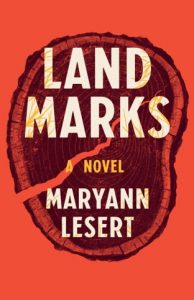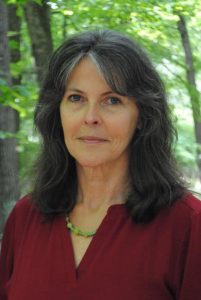Authors Interviewing Characters: Maryann Lesert
Land Marks, A Novel
by Maryann Lesert
 Book Summary: Tired of watching Michigan’s forests devastated by fracking as leaders refuse to act on climate change, four eco-minded students, a few seasoned activists, and some wildly creative locals stand together to say, “No more!”
Book Summary: Tired of watching Michigan’s forests devastated by fracking as leaders refuse to act on climate change, four eco-minded students, a few seasoned activists, and some wildly creative locals stand together to say, “No more!”
In the river-crossed north woods of Michigan, Kate, Brett, Sonya, and Mark, mentored by their former professor Rebecca, keep watch as North American Energy (NorA) connects a corridor of frack well sites deep in the state forests. When NorA expands in unexpected directions and their awful, bigger plan becomes clear, the action begins.
As grassroots activists gather and prepare to stop NorA’s dangerous superfrac, stresses other than the fracturing of the bedrock appear: Sonya is arrested, Rebecca reveals her hidden past, and the one person who knows both women’s stories arrives in camp. But love and solidarity want to win, even if most showdowns with Big Oil don’t end well for those who take a stand.
Land Marks is a tribute to the waterways that connect us, the land that sustains us, and the moments that inspire us to rise up, together, to say, “No more!”
Maryann Lesert interviews Rebecca, narrator of Land Marks.
Maryann Lesert: You’ve got some great students in Kate and Brett and Sonya and Mark. I understand that they all came together in one of your classes?
Rebecca: The four of them met in my EcoLit class, and they formed a strong bond. Now that I’ve known them for a while, I can see the strengths each of them brings to their research and activism. Kate and Brett bounce around ideas, Mark is the tech wizard, and Sonya is the person who keeps them all grounded.
ML: What’s been the highlight, or maybe the lowlight, of you and your students’ research?
Rebecca: Well, we set out to learn the science and the risks of fracking. Then, we learned the real story, the sensory story, by visiting a lot of frack well sites. Witnessing the wrongness of that level of industrial might in the middle of the forest—the screeching and grinding of a 120-foot tall drill rig rising over the trees—that’s a lowlight.
But there have been highlights, too. The people we’ve met, especially, people living with fracking who trusted us to tell their stories, believing that if the public knew what fracking really looks and smells and feels like, we would all want to stop it.
ML: Are all of your students as active and engaged as these four?
Rebecca: Sometimes young people are labeled apathetic, disengaged, but what I see in my classes are students who are weighed down by eco-grief. They have been told, since 5th grade, that they’re screwed—that climate change and irreparable damage to our ecosystems will be their norm.
But at the same time, they’re done with the “doom and gloom.” They know the reality of climate change, and they’re tired of inaction. They want to know there is something they can do.
ML: What can we do, when we’re looking at something as huge and critical as climate change?
Rebecca: A lot of our stories romanticize activism. Sure, there have been important leaders and activists, but activists aren’t born. An activist isn’t some special, superhuman who shows up with everything we need to fight injustice or protect the Earth. That’s the first hurdle. To recognize that activists aren’t perfect, and we don’t have to be perfect or have all the answers, either, to show up.
I think that’s why we’re obsessed with super heroes. We’re living in a time when great change needs to occur. Climate change and all sorts of injustices need to be addressed, and knowing this can be incredibly overwhelming.
ML: How do we approach this sense of being overwhelmed, then?
Rebecca: Well, I think we start by acting locally, when it comes to protecting water, land, and air. There used to be a phrase in sustainability that said, “Think globally, act locally.” We need to be aware of intertwined issues such as environmental and women’s rights, how the health of the Earth and the rights of women are at risk. But trying to act on that scale feels absolutely debilitating.
Still, we can show up, each in our own way, in our own places.
ML: You mentioned that environment and women’s rights are intertwined. Can you explain what you mean?
Rebecca: Sure. The term ‘ecofeminism’ is a start. Basically, and I’m really paraphrasing here, in a patriarchal society, women and Earth are treated as sustenance, as resources that our society depends upon and is entitled to. Women and Earth are also creative forces, life-giving, and in a society that seeks to control, that creative power is something to fear. So, instead of officially recognizing that women and the natural world have intrinsic value, wisdom, and power of their own, a patriarchal society wants that power to be under its control.
I think a lot of people recognize what a dangerous time we’re living in, right now, in terms of the rights of women and Earth. The desire to control and to harness is pretty evident in politics in the U.S. and around the globe.
ML: Wow. We went into some pretty deep territory there, didn’t we?
Rebecca: I guess we did. If it’s okay, I’d like to return to the idea of place.
ML: Sure. Let’s talk about place.
Rebecca: Connection to place is important. It keeps us connected to each other, too. When we become a part of our place, we learn to empathize with people protecting their places.
I think it’s important, too, to recognize our history of injustices when it comes to Indigenous communities and communities of color. Even in our placement of oil refineries and chemical plants, people living in poverty and communities of color have experienced the brunt of the burdens of the fossil fuel era.
The right to protect water, land, air—the right to protect our homes—hasn’t been granted equally. We have a lot of justice work to do.
ML: What’s it like to be a part of your place?
Rebecca: Michigan is surrounded by water, so water is a central part of our identity. It’s also a place of coastlines, a place where water and land meet. There’s a constant sense of change brought on by the weather, in the waves of big water, which makes you feel small in the best way. We’re water people, for sure.
ML: And you’re a climber, right? You climb trees?
Rebecca: I do. It’s an incredible feeling to be up in the trees, listening to their leaves. To position your body with them, to feel them move from roots to crown. The trees and other rooted beings have witnessed a lot of life moving through the forest.
ML: Do you talk to the trees?
Rebecca: Of course. Trees, stones, water. The deer, the birds. The more-than-human world has so much to teach us.
ML: Here’s a question I hear a lot lately. What’s bringing you joy?
Rebecca: Easy. Time in the natural world and pure, simple solidarity. When people gather together, when we stand together, that’s downright fun. Feeling a common purpose. People power brings me joy.
ML: On the flipside, what has you worried?
Rebecca: The fragility of democracy. Threats to democracy are dangerous for women and Earth, that tops my list. Close after, comes the flattening of people and culture that comes when we lose ourselves in the digital environment and let algorithms and advertising rule our lives.
Nothing a good, long walk outdoors can’t heal, if we leave the handhelds at home.
BUY LANDMARKS HERE
—
 Maryann Lesert writes about people and place in equal measure. Her first novel, Base Ten (Feminist Press, 2009), featured an astrophysicist’s quest for self among Lake Michigan’s forested dunes and the stars. Before novels, Maryann wrote plays, including three full-lengths, five one-acts, and collaborations with a memoirist and a local symphony. Maryann lives in west Michigan, where she teaches writing, enjoys time in the natural world (shared with family and friends), and writes by the big lake.
Maryann Lesert writes about people and place in equal measure. Her first novel, Base Ten (Feminist Press, 2009), featured an astrophysicist’s quest for self among Lake Michigan’s forested dunes and the stars. Before novels, Maryann wrote plays, including three full-lengths, five one-acts, and collaborations with a memoirist and a local symphony. Maryann lives in west Michigan, where she teaches writing, enjoys time in the natural world (shared with family and friends), and writes by the big lake.
Category: On Writing























